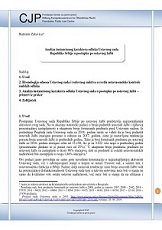Analiza instancionog karaktera odluka Ustavnog suda Republike Srbije u postupku po ustavnoj žalbi
An Analysis of the Instance Character of the Decisions of the Constitutional Court of the Republic of Serbia in the Constitutional Appeal Proceedings
Author(s): Radomir Zekavica
Subject(s): Constitutional Law, Human Rights and Humanitarian Law, Public Law
Published by: Fondacija Centar za javno pravo
Keywords: Constitutional Court; Serbia; court decisions; constitutional appeal; protection of human rights; public law;
Summary/Abstract: Constitutional appeal has become an effective tool for protection of human and minority rights and freedoms by the Constitution of Republic Serbia in 2006. Since than, he Constitutional court has the opportunity to review the individual legal acts in the constitutional appeal procedure. However, from the outset, the question arose as to whether this power of the Constitutional Court also implied the possibility of reviewing court decisions; does it include the right of the Constitutional court to annul court decisions if it found that they had been violated a constitutionally protected right. In its jurisprudence, the Constitutional court overturned court decisions in such situations, which led to controversy and latent conflict in the relationship of this court to the ordinary judiciary, esspecialy to the Supreme Court. Since 2013, the Constitutional court's ability to overturn court decisions in proceedings on constitutional appeal has also been confirmed by a Constitutional Court decision declaring a legal provision under which it had no right. To date, the Constitutional Court has overturned 3,867 court decisions, which is not an insignificant number. The key question is whether he assumes the authority and role of the classic courts of the ordinary court. An analysis of the case-law and the views of the Constitutional Court shows that it does so in two basic cases - when there is obvious arbitrariness in the application of the law of ordinary courts and in the case of an insufficiently reasoned court decision. In both cases, the Constitutional Court often finds itself in slippery ground, because by its interpretation and argument it often delves into the sphere reserved by the regular judiciary.
Series: Fondacija Centar za javno pravo - Projekti
- Page Count: 14
- Publication Year: 2019
- Language: Serbian
- Introduction
- Content File-PDF

